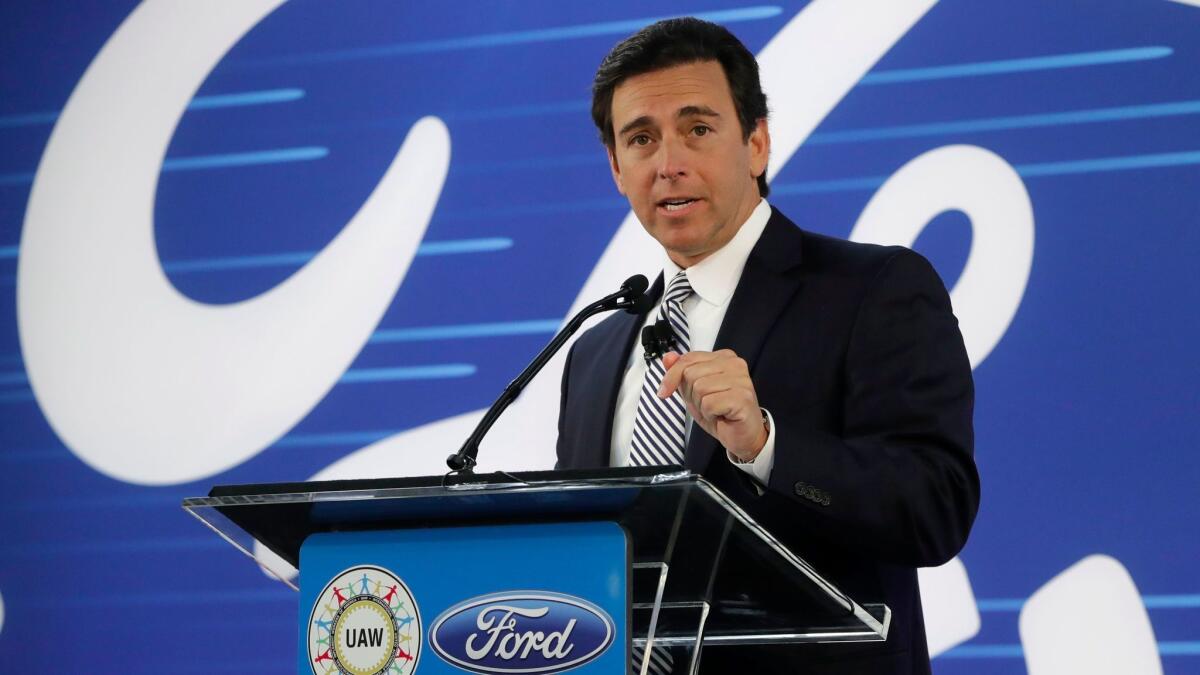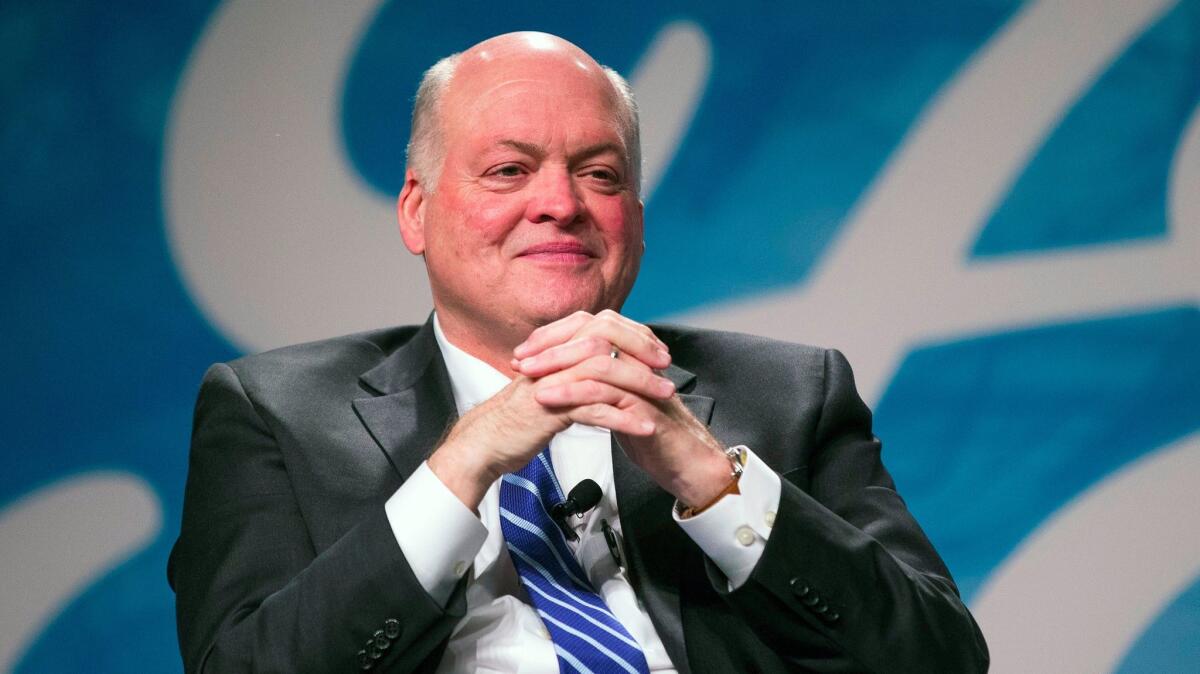Ford ousts CEO as auto industry faces biggest transformation ever

- Share via
Reporting from San Francisco — In the latest sign that driverless cars and other revolutionary new technologies are shaking automakers to their roots, the chief executive of Ford Motor Co. just got tossed.
The replacement of Mark Fields with Jim Hackett, who had been running a new unit focused on cutting-edge transportation, is a big deal for Ford. But with the auto industry in upheaval, it’s only the opening act in a long-running drama that will roil the automakers for many years to come.
“The demise of Mark Fields represents the challenge facing the auto industry in general – how do you keep doing your traditional business while you move into self-driving cars and vehicle connectivity and car sharing and ride sharing?” said Bill Hampton, editor in chief at Auto Beat Daily, an industry publication based in Detroit.
“You don’t see any established car company in any country that has this thing figured out,” he said.
Bill Ford and Hackett, 62, took the stage at the company’s Dearborn, Mich., headquarters for the live-streamed announcement Monday.
The takeaway: The company is too slow. Operations are too inefficient. Ford’s vision of the future is too fuzzy. Employees aren’t having enough fun.

“I know we can do better,” Hackett said. “I know we can build enthusiasm for Ford.”
Shareholders were restive with Ford’s performance. The stock had declined around 40% since Fields took over in 2014, while the market in general soared. Ford’s net income was down 36% in the first quarter this year, and the company continues to lose market share.
Ford stock price rose about 2% Monday on the news, closing at $11.10 a share.
Fields, 56, served as Ford CEO for three years, replacing the highly lauded Alan Mulally, who had retired. On Monday, Ford said in an official statement that Fields is retiring too. He was replaced by Hackett, 62, who was running the company’s Smart Mobility business.
While nobody at Ford said Fields was fired, Executive Chairman Bill Ford put it this way at the Monday event: “We had a board meeting on Friday…. Mark and I got together and decided it would be a good time for him to resign.”
Now it’s up to Hackett to turn things around. He’s widely respected among fellow business executives, having lifted Steelcase from a small Michigan furniture company to a global powerhouse in office furniture and design. He also helped turn around the University of Michigan’s troubled athletics program.
Hackett sat on Ford’s board of directors when the company tapped him to run its new Smart Mobility unit.
He called Fields “an extremely dedicated CEO” and said he plans to stay in touch with him. “I’m going to a football game with him in the future,” Hackett said.
Stock prices are lagging for nearly all major auto companies, though Ford trails most of them. Last month, auto startup Tesla passed Ford in market value, and it has occasionally topped General Motors.
“I was somewhat surprised by the change,” said Efraim Levy, stock analyst at CFRA Research, said of Monday’s announcement. “It’s really about the frustration with the stock price.”
His firm still has a “buy” on Ford shares. “We think there’s a lot of value in the company, and while you wait there’s a 5.5% dividend right now.”
General Motors, meantime, is gaining in profits and market share, but faces the same turbulent trends as every other company.
The automakers face two huge problems.
One is financial. Sales have plateaued after seven straight years of gains, and forecasters expect a decline over the next few years.
The other is the fact that the business model for the auto industry is changing fast, and it’s not clear what the future will look like.
Tech companies like Google. Apple and Uber are moving into the business. Auto suppliers are trying to remake themselves for a future of self-driving cars.
Entertainment companies see a whole new in-car audience as a robot relieves humans from driving their vehicles. Most forecasters agree that individuals will increasingly move away from car ownership toward ride-hailing and car-sharing.
And it’s all happening right now.
“Time’s a wastin’, and everyone in the industry knows it,” Hampton said. “Things are changing more fundamentally than any time since the beginning of the auto business.”
Fields was not by any means standing still. Under his leadership, Ford made significant investments in startup companies aimed at industry transformation — driverless technology, artificial intelligence, autonomous vehicle map-making, app-powered commuter-bus services and more.
Ford’s chief financial officer said Monday that plans to spend $4.5 billion developing electrified vehicles and more than $1 billion on autonomous cars are moving forward. Last week the company said it would cut 10% of its workforce, mostly white-collar jobs, to help pay for those investments and more.
The trick for all the Detroit companies, though, is keeping short-horizon shareholders happy, or happy enough, while investing for the future. It doesn’t help that they’re competing with companies, like Tesla, whose shareholder base has bought into a vision of that future — and is willing forego profits in the meantime.
Bill Ford and Hackett said communication was a problem, with shareholders, employees, the media and others.
That problem is apparently so serious that Bill Ford, the great-grandson of founder Henry Ford, will take over communications and government relations.
Ford also said it will reassign several executives to make better use of data and software for factory automation, product planning and the mobility business.
That’s in part a reaction to Tesla, which is putting advanced self-driving technology on the road now, streaming software updates to the vehicles, and pushing more software, robotics and artificial intelligence into its factories.
Hackett said Ford doesn’t have to cede the future “to anybody. Tesla, anybody.”
Twitter: @russ1mitchell







